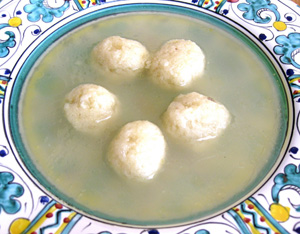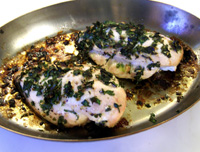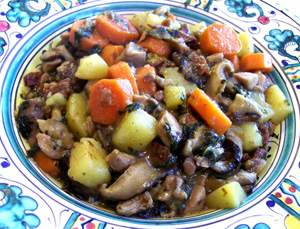 Making Passover dinner takes a bit of planning, but it doesn't have to be a chore. If you're cooking for a big group, hand out assignments so you don't do all the work. If your kitchen is large enough, invite people over to help. Cooking the dinner with friends and family can be as much a part of a celebration as the meal itself.
Making Passover dinner takes a bit of planning, but it doesn't have to be a chore. If you're cooking for a big group, hand out assignments so you don't do all the work. If your kitchen is large enough, invite people over to help. Cooking the dinner with friends and family can be as much a part of a celebration as the meal itself.
Everyone wants to save money these days. But keeping an eye on food costs shouldn't mean cutting corners on quality and flavor. Avoid buying packaged or frozen meals and you'll be way ahead of the game. Besides saving money, you'll be eating healthier food.
On Passover, I practice what I preach by using one chicken to make three dishes. My Jewish mother would be very proud.
For me it's not Passover without matzo ball soup. But soup is only as good as the stock. Canned and packaged chicken broth are very high in salt content and, in my opinion, have an unpleasant flavor. It's much better to make your own.
The broth can be made days ahead, kept in the refrigerator or even frozen. Also, when you buy the chicken, buy a whole one, preferably a free range or organic chicken, and cut it up yourself. Whole chickens cost under $2.00/pound, while chicken parts range from $3.50-$8.00/pound.
Cutting up a Chicken
If you haven't done it before, cutting apart a whole chicken is easier than you think. Having a sharp boning or chef's knife is essential.
To remove the wings, thighs, and legs, slice through the meat and separate at the joints. Cut the wings apart, reserving the tips for the stock. To debone the breasts, glide the knife along the side of the breast bone. As you cut, pull back the breast meat, continuing to slide the knife against the ribs.
For health reasons, I remove the skin and fat from the breasts, legs and thighs. Add the skin and fat to the stock. If you're going to debone the legs and thighs, add those bones to the stock as well.
Drizzle olive oil on the breasts, legs, thighs, and wings. Put them into an air tight container and refrigerate. If you want to freeze them, put the pieces into a Ziploc style plastic bag, squeeze out the air, seal, and freeze.
Here's another tip about freezing the chicken. When you put the pieces into the plastic bag, make sure they don't touch one another. That way, if you need only one piece, say a breast, you can leave the other pieces frozen until you need them.
Chicken Stock
When my mother and grandmother made chicken stock, they added onions, celery, and carrots to the water. I don't because I want the stock to taste of chicken. If I want other flavors, I add them later.
Yield: 2 quarts
Time: 60 minutes
Ingredients
Skin, wing tips, carcass, and bones from one 4 1/2 pound chicken
4 quarts water
Method
Put the wing tips, skin, carcass, and bones into a large pot with the water, bring to a boil, reduce the heat and simmer for 60 minutes. Skim off and discard the foam. The volume will reduce by half.
Strain the stock. Pick off any meat from the carcass and reserve for later use in a salad or a chicken-vegetable soup. Discard the bones and skin.
Refrigerate overnight to easily remove the fat solids. If you're rushed for time and need the stock right away, float a slice of bread on top of the stock to absorb the fat.
The stock can be kept in the refrigerator in an air tight container for a day or two or in the freezer for months.
Matzo Ball Soup
Yield: 6-8 servings
Time: 30 minutes
Ingredients
1 box matzo ball mix (no soup), Manischewitz, Rokeach, or Streit's
Other ingredients per the directions on the packaged mix
2 quarts chicken stock
Method
Prepare the matzo balls per the directions on the box. Make them large or small as you like. Remember that the size of the matzo ball will double as it cooks in the salted water. 1 box of mix will make 24 small matzo balls or 12 large ones.
Put the chicken stock into a large pot. Use a slotted spoon to transfer the matzo balls from the salted water to the stock. Heat over a medium flame. Because the matzo balls are delicate, don't let the stock boil.
Garlic-Parsley Chicken Breasts
On any other day but Passover, serve the sliced chicken on top of buttered pasta. Yield: 4-6 servings
Yield: 4-6 servings
Time: 30 minutes
Ingredients
2 chicken breast halves, boned, skinned, washed, and dried
1/2 cup Italian parsley, washed, finely chopped
2 garlic cloves, peeled, finely chopped
1 tablespoon olive oil
1/4 teaspoon sea salt
Pinch of pepper
1 tablespoon sweet butter
Method
Preheat the oven to 350 degrees. Melt the butter in the saute pan. Dredge the chicken breasts in olive oil seasoned with sea salt and black pepper
Put the breasts in the heated pan, top with parsley and garlic, drizzle with olive oil, and bake for 30 minutes.
Slice the breasts and plate. Use a rubber spatula to remove the drippings, garlic, and parsley and spoon onto the slices before serving.
Mushroom-Vegetable Chicken Ragout
Yield: 4-6 servings
Time: 60 minutes
Ingredients
2 chicken legs, skin removed, deboned, roughly chopped
2 chicken thighs, skin removed, deboned, roughly chopped
2 chicken wings, tips removed, cut apart at the joint
4 garlic cloves, skins removed, finely chopped
4 shallots or 1 medium yellow onion, peeled, roughly chopped
2 carrots, washed, peeled, cut into thick rounds
1 bunch parsley, washed, stems removed, finely chopped
1 large Yukon Gold potato, washed, cut into chunks
4 shiitake or brown mushrooms, washed, thinly sliced
Method Heat the olive oil in a large sauce pan, season with sea salt and pepper, saute the chicken until lightly browned. Remove from the pan, drain on paper towels, set aside.
Heat the olive oil in a large sauce pan, season with sea salt and pepper, saute the chicken until lightly browned. Remove from the pan, drain on paper towels, set aside.
Saute the garlic, shallots, mushrooms, carrots, parsley, and potatoes until lightly browned. Return the chicken to the pan. Add 3 cups of water. Simmer for 45 minutes until the meat is tender. There should be 1 cup of broth. Taste and adjust the seasoning. Continue simmering another 10 minutes.
Serve with steamed spinach or broccoli.
Variations
Instead of using potatoes, serve over rice
Add spinach leaves
Add cut up celery
David Latt is an Emmy-award winning television producer who turns to cooking to alleviate stress. He shares his experiences with food and his favorite recipes on his blog Men Who Like To Cook.

